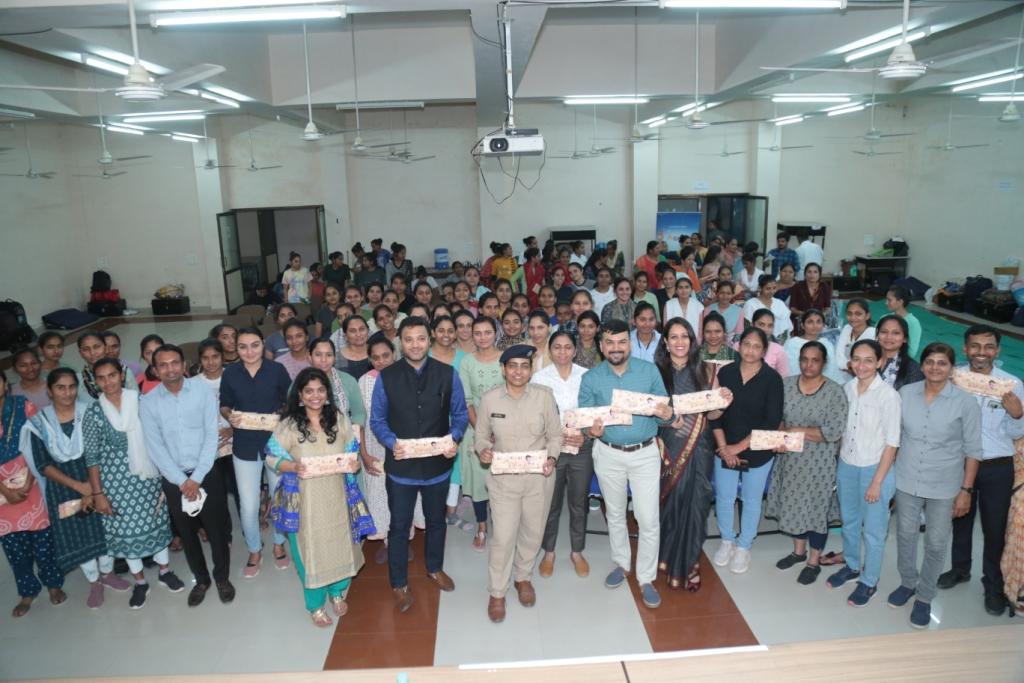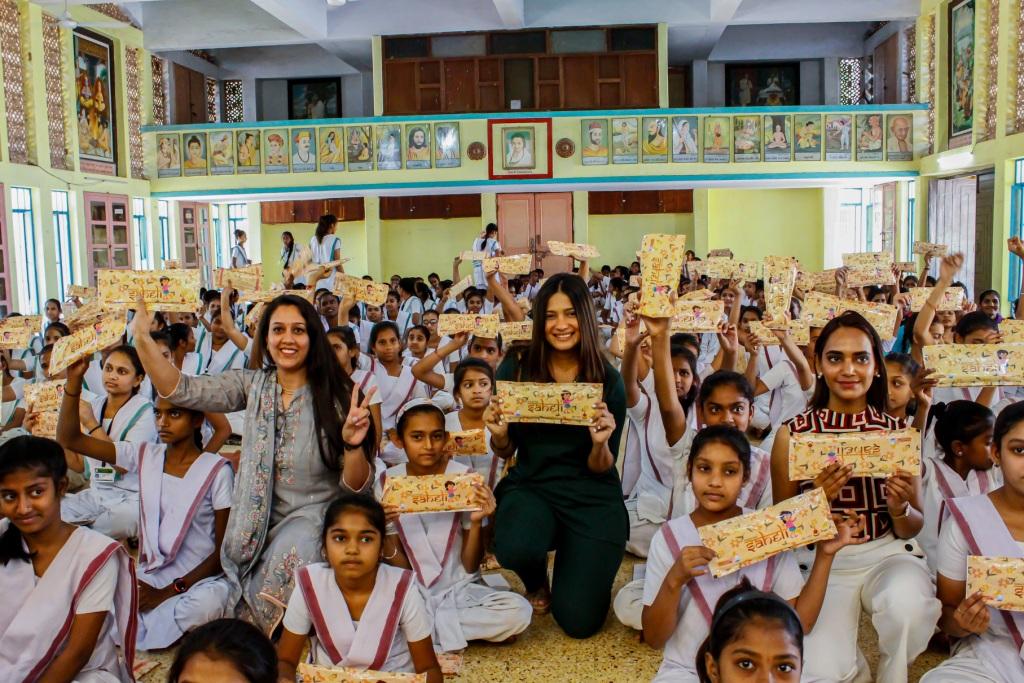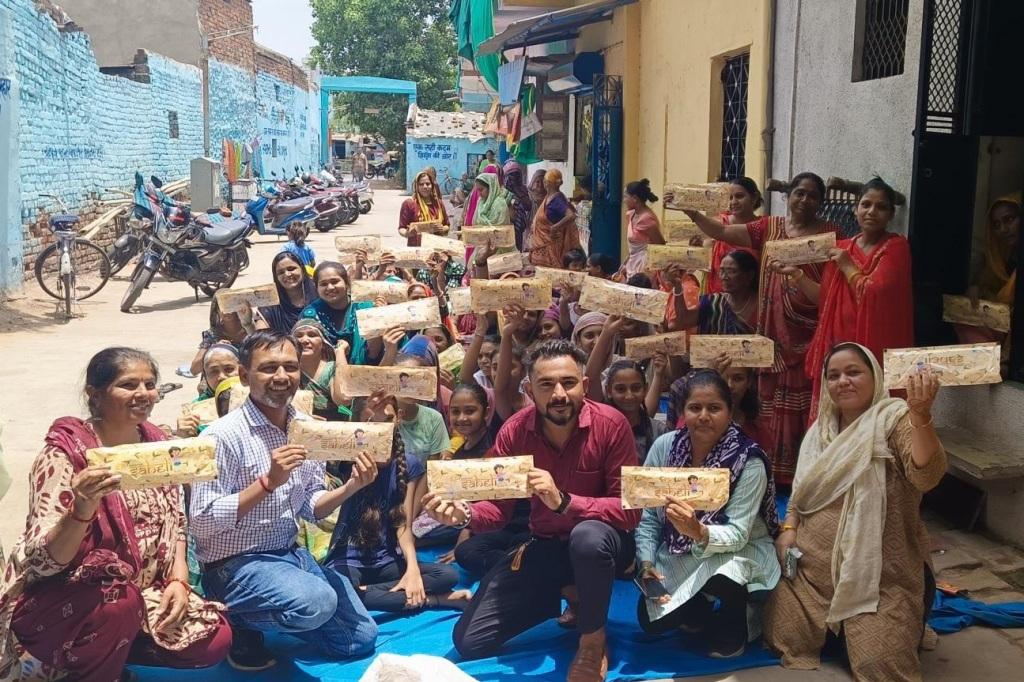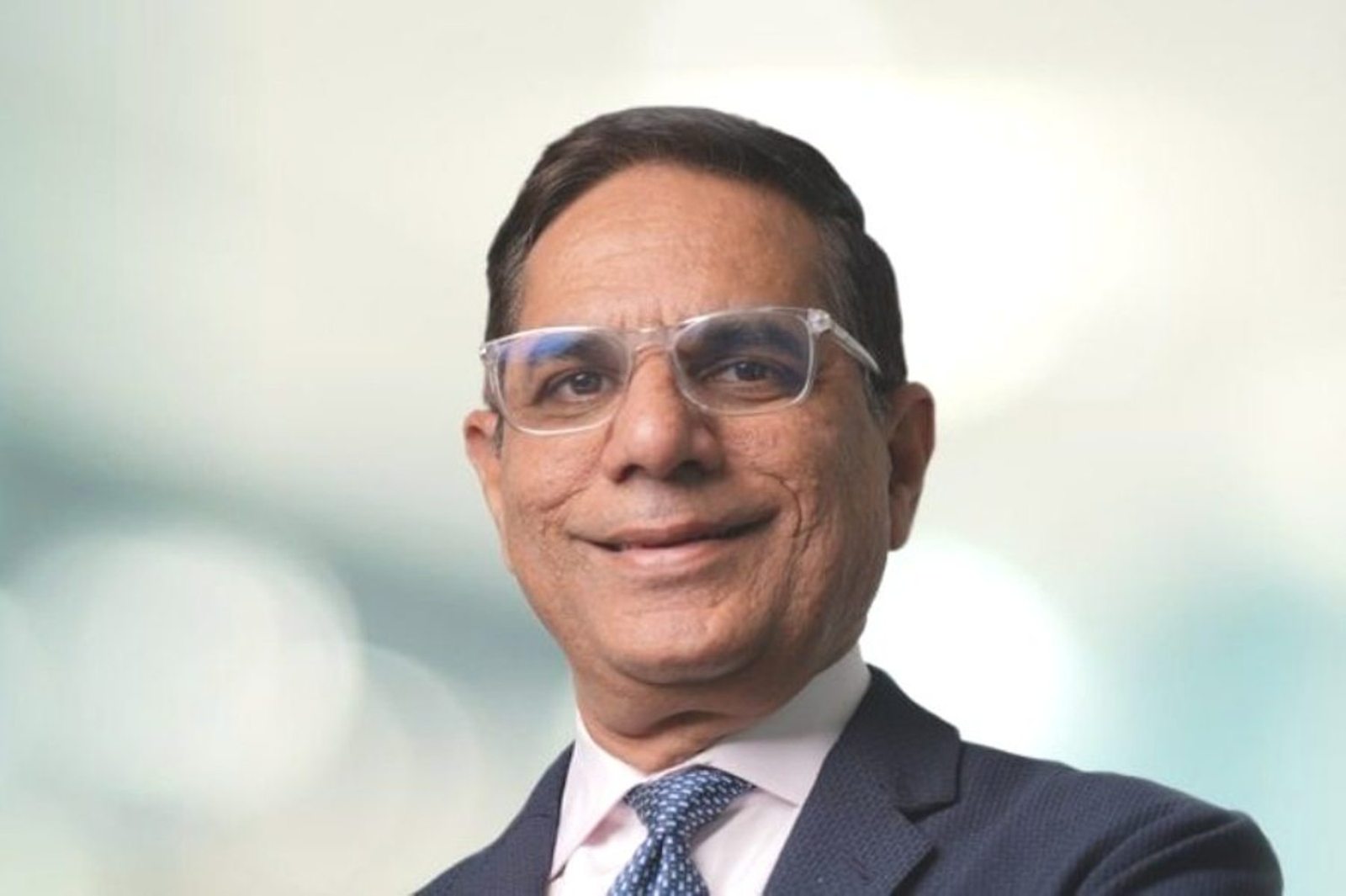Period poverty, social stigma, and the challenges of prisoner rehabilitation are often tackled individually, but Apexon’s Ignite program takes a bold and innovative approach by addressing them holistically. What happens when these issues intersect? The answer lies in a story of empowerment, transformation, and hope.
 Through a unique partnership with the Karma Foundation and Sabarmati Prison, Apexon’s Ignite program has launched an initiative that empowers women inmates to manufacture biodegradable sanitary pads, branded as “Sabarmati Saheli.” This initiative builds upon the existing success of Apexon's Happy Periods program, which promotes menstrual wellness and has already reached over 15,000 beneficiaries through 75,000 workshops and 120 hours of training, distributing over 1 million Sabarmati Saheli kits to 100+ locations. These pads are not only distributed to underserved communities across India, addressing menstrual health challenges, but also provide women behind bars with valuable skills, financial independence through four specialized skill development programs, and a renewed sense of purpose.
Through a unique partnership with the Karma Foundation and Sabarmati Prison, Apexon’s Ignite program has launched an initiative that empowers women inmates to manufacture biodegradable sanitary pads, branded as “Sabarmati Saheli.” This initiative builds upon the existing success of Apexon's Happy Periods program, which promotes menstrual wellness and has already reached over 15,000 beneficiaries through 75,000 workshops and 120 hours of training, distributing over 1 million Sabarmati Saheli kits to 100+ locations. These pads are not only distributed to underserved communities across India, addressing menstrual health challenges, but also provide women behind bars with valuable skills, financial independence through four specialized skill development programs, and a renewed sense of purpose.
In an inspiring conversation with TheCSRUniverse, Mr. Vinu Venkatesh, Group CFO & Chief Administrative Officer at Apexon, delves into the profound impact of this initiative. From restoring dignity to underserved women to giving inmates a second chance at life, this program is a shining example of CSR that goes beyond the surface.
Read on to learn more about the stories, challenges, and vision behind this transformative program.
Q&A
Q. How did Apexon’s 'Ignite' program come about, and what inspired the focus on women’s health, particularly menstrual wellness and skill development for prison inmates?
A. Ignite is Apexon’s platform for driving social change. Launched in 2009, it started as a group of volunteers among Apexon associates aiming to contribute meaningfully to their communities. Over the years, Ignite evolved to address critical issues such as education for underprivileged children, STEM education promotion, and vocational training. One key focus area has been women’s health, particularly menstrual wellness.
The Happy Periods initiative emerged from recognizing the need to break societal taboos around menstruation. Period poverty remains a significant social challenge in India, where menstruation continues to be surrounded by stigma and silence. Many girls grow up without adequate knowledge, tools, or resources to manage their menstrual health confidently. The lack of awareness and support often leads to missed opportunities, affecting their education and self-esteem. Through our Ignite platform, we wanted to change this through workshops that foster open dialogue and distribute menstrual hygiene kits. The initiative expanded to urban slums and rural areas, eventually reaching 18 states in India. Integrating the Happy Periods initiative with the Ahaan Vocational Centre at Sabarmati Jail further amplified its impact by enabling women inmates to manufacture biodegradable pads, restoring their dignity and aiding their rehabilitation.
Q. Can you share more about the collaboration between Apexon, Karma Foundation, and Sabarmati Prison? What has been the response from the women inmates involved in making biodegradable sanitary pads?
A. In 2022, Apexon partnered with the Karma Foundation and Sabarmati Prison to launch the Ahaan Vocational Centre and a pad manufacturing unit for women inmates. This initiative was designed not only to provide skills and income but also to instil a sense of purpose. The response from inmates has been overwhelmingly positive. Engaging in meaningful work has helped them cope with mental health challenges and regain confidence.
A standout moment was the convocation ceremony, where prison officials celebrated the inmates' achievements alongside them. For many, it was the first time they felt recognized and valued. Such experiences have had a profound impact, fostering a sense of hope and belonging.
 Q. With over 1 million Sabarmati Saheli kits distributed, how has the initiative been received in underserved communities, and what measurable impact have you seen in terms of women’s health awareness and hygiene?
Q. With over 1 million Sabarmati Saheli kits distributed, how has the initiative been received in underserved communities, and what measurable impact have you seen in terms of women’s health awareness and hygiene?
A. The Sabarmati Saheli Kits and Happy Periods workshops have been incredibly rewarding to witness in action. I’m proud to see how they’ve created greater awareness of safe menstrual practices in underserved communities. It’s especially fulfilling to know that most of the girls and women who received the kits have embraced the use of the sanitary products we provided. These workshops have also become safe spaces for open conversations, helping to break down taboos and foster period positivity.
Hearing encouraging feedback from grassroots women leaders has been truly inspiring. Their insights highlight the growing demand for these initiatives and reflect a powerful shift toward healthier habits and increased confidence among women and girls in managing their menstrual health. This progress reinforces my belief in the importance of these efforts and the transformative impact they can have.
Q. How does the skill development training at Sabarmati Prison align with the current government initiatives aimed at rehabilitating prisoners and promoting financial independence?
A. The skill development training aligns with government efforts to rehabilitate prisoners by equipping them with vocational skills that will make them financially self-sufficient once they re-enter society. Many inmates lacked economic opportunities before incarceration. The program not only prepares them for financial independence post-release but also improves their mental health during imprisonment by giving them a purpose.
Q. In terms of sustainability, how does the initiative ensure the long-term impact of the biodegradable sanitary pads, and how are you measuring the success of these efforts?
A. At Apexon, we believe true success arises from sustainable, ethical and responsible business practices. Our ESG philosophy underpins many of our Ignite initiatives, from tree-planting drives and water body rejuvenation to empowering underserved communities.
Our Sabarmati Saheli biodegradable hygiene products are a good example of this alignment, addressing both social and environmental challenges. These products tackle the issue of non-biodegradable sanitary waste, which can take centuries to decompose, while simultaneously promoting menstrual health and dignity.
Through Ignite, we not only distribute these products but also focus on educating communities about proper disposal methods and the benefits of adopting sustainable alternatives.
For me, success is reflected in the feedback we receive from beneficiaries and the tangible changes we observe in behaviour regarding menstrual health and disposal practices. The growing adoption of sustainable habits and heightened awareness about menstrual health are clear indicators of the positive impact we are making.
Q. What role do empathy and community play in Apexon’s CSR strategy, and how do these values drive initiatives like Happy Periods to create lasting social change?
A. Our core values of empathy and community are central to Apexon’s CSR strategy. Ignite exemplifies these values by involving employees in initiatives that directly impact communities. For example, during the Global Ignite Week in 2024, over 500 Apexon associates across India, UK and North America dedicated more than 2,500 hours to activities like serving meals, distributing food boxes, and painting school walls.
The Happy Periods initiative, led by a team of dedicated volunteers, embodies these values by addressing menstrual health and breaking social taboos. Through these efforts, Apexon fosters a culture of care and social responsibility.
Q. Can you share a success story from the initiative that stands out to you, particularly in terms of an inmate’s transformation or the positive impact on a community?
A. Since the inception of Ignite's Sabarmati Saheli Pad Manufacturing Units and Happy Periods initiatives, I’ve witnessed stories of resilience and transformation. One that stands out is Kusum's (name changed for confidentiality).
During a convocation at the prison, Kusum shared her experience of being part of this program. Receiving a certificate for her achievements filled her with pride—a rare feeling in her circumstances. She said, "I don’t feel like a prisoner anymore; I feel like a student living in a hostel." Her words reflected the initiative's deeper impact—fostering dignity, purpose, and hope.
Another story is that of Amara (name changed), a young African woman who found hope and resilience through her involvement in the initiative after facing despair in a foreign prison. Working in the pad manufacturing unit gave her meaningful engagement and renewed resilience.
These stories highlight the program’s transformative power, helping inmates rebuild their lives and prepare for reintegration into society.
This initiative does more than build skills—it offers entrepreneurial opportunities inmates can use after their release, addresses mental health challenges, and reduces recidivism. For many, it transforms incarceration into a chance for growth and reintegration. Kusum and Amara's stories remind me of the profound impact compassion and opportunity can have, even in the most challenging circumstances.
 Q. How do you foresee expanding these initiatives to other prisons or communities, and what challenges might you face in scaling this model?
Q. How do you foresee expanding these initiatives to other prisons or communities, and what challenges might you face in scaling this model?
A. The success of the Sabarmati Saheli and Happy Periods initiatives has sparked interest in replicating the model in other prisons and communities. While scaling presents challenges, such as logistical complexities and resource constraints, Apexon remains committed to expanding these efforts.
By leveraging partnerships and building on the program’s proven impact, Apexon aims to create a broader reach and sustain its mission of social transformation.
Q. How does Apexon envision leveraging its digital-first approach to enhance the reach and impact of social programs like Happy Periods, especially in remote areas or marginalized communities?
A. As a digital technology services organization, we leverage digital tools in our CSR programs to amplify our initiatives. This includes creating educational content on menstrual health, training schoolteachers through virtual programs, and using gamification to engage communities. By democratizing access to information, Apexon aims to reach remote and marginalized areas more effectively.
Beyond the Happy Periods initiative, our team leverages their digital skills and expertise to support programs such as STEM education for school children and digital skilling initiatives for youth, equipping them with the tools and knowledge needed for job readiness.
Q. How does the initiative at Sabarmati Prison contribute not only to the livelihood of the inmates but also to their mental rehabilitation, and how do you address the challenge of societal acceptance for these women once they are released?
A. Vocational programs like Sabarmati Saheli hold immense value in fostering mental rehabilitation by offering inmates a sense of purpose and economic independence. For many women, the income they earn through this initiative serves as a critical support system post-release, enabling them to reintegrate into society and rebuild their lives. Through our efforts, we address not only the practical challenges of livelihood and reintegration but also help instill self-belief and dignity, empowering these women to embrace their second chance at life with confidence.





 Through a unique partnership with the Karma Foundation and Sabarmati Prison, Apexon’s Ignite program has launched an initiative that empowers women inmates to manufacture biodegradable sanitary pads, branded as “Sabarmati Saheli.” This initiative builds upon the existing success of Apexon's Happy Periods program, which promotes menstrual wellness and has already reached over 15,000 beneficiaries through 75,000 workshops and 120 hours of training, distributing over 1 million Sabarmati Saheli kits to 100+ locations. These pads are not only distributed to underserved communities across India, addressing menstrual health challenges, but also provide women behind bars with valuable skills, financial independence through four specialized skill development programs, and a renewed sense of purpose.
Through a unique partnership with the Karma Foundation and Sabarmati Prison, Apexon’s Ignite program has launched an initiative that empowers women inmates to manufacture biodegradable sanitary pads, branded as “Sabarmati Saheli.” This initiative builds upon the existing success of Apexon's Happy Periods program, which promotes menstrual wellness and has already reached over 15,000 beneficiaries through 75,000 workshops and 120 hours of training, distributing over 1 million Sabarmati Saheli kits to 100+ locations. These pads are not only distributed to underserved communities across India, addressing menstrual health challenges, but also provide women behind bars with valuable skills, financial independence through four specialized skill development programs, and a renewed sense of purpose. Q. With over 1 million Sabarmati Saheli kits distributed, how has the initiative been received in underserved communities, and what measurable impact have you seen in terms of women’s health awareness and hygiene?
Q. With over 1 million Sabarmati Saheli kits distributed, how has the initiative been received in underserved communities, and what measurable impact have you seen in terms of women’s health awareness and hygiene? Q. How do you foresee expanding these initiatives to other prisons or communities, and what challenges might you face in scaling this model?
Q. How do you foresee expanding these initiatives to other prisons or communities, and what challenges might you face in scaling this model?












.jpg)



